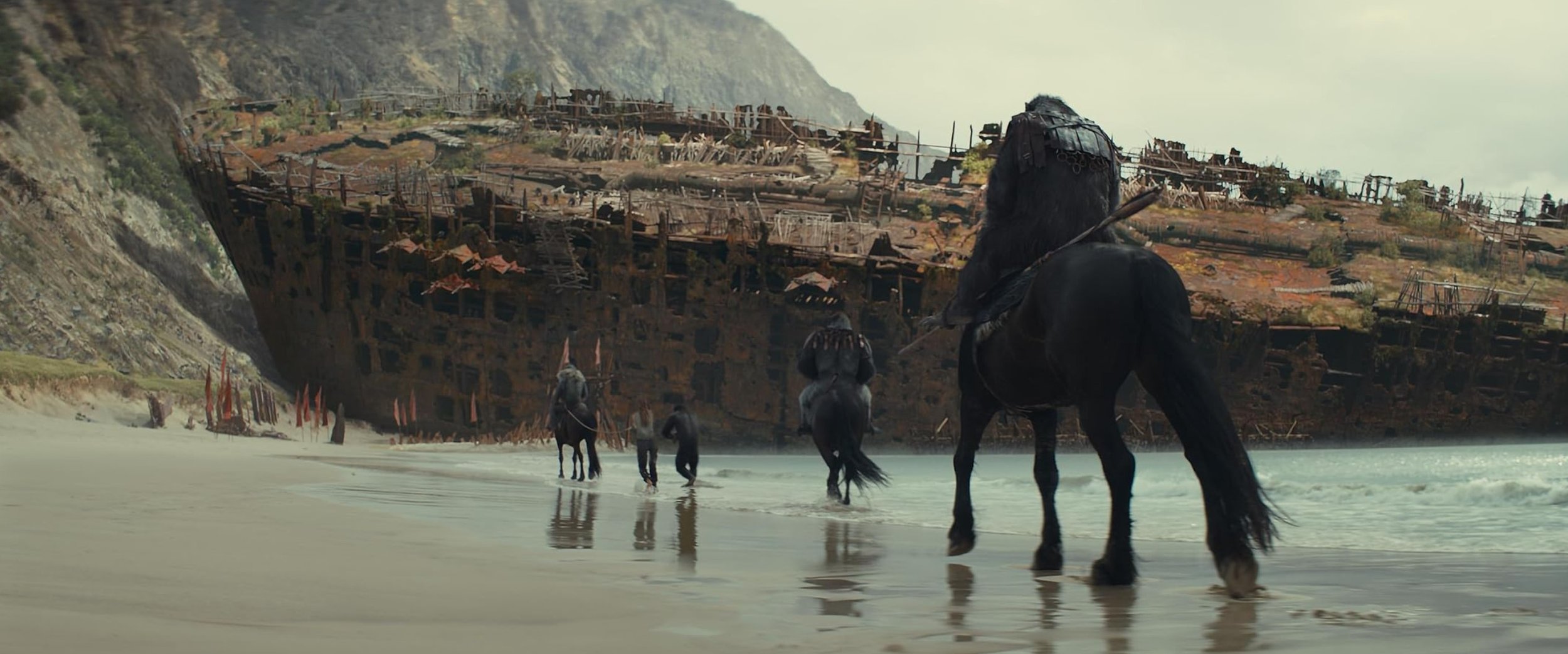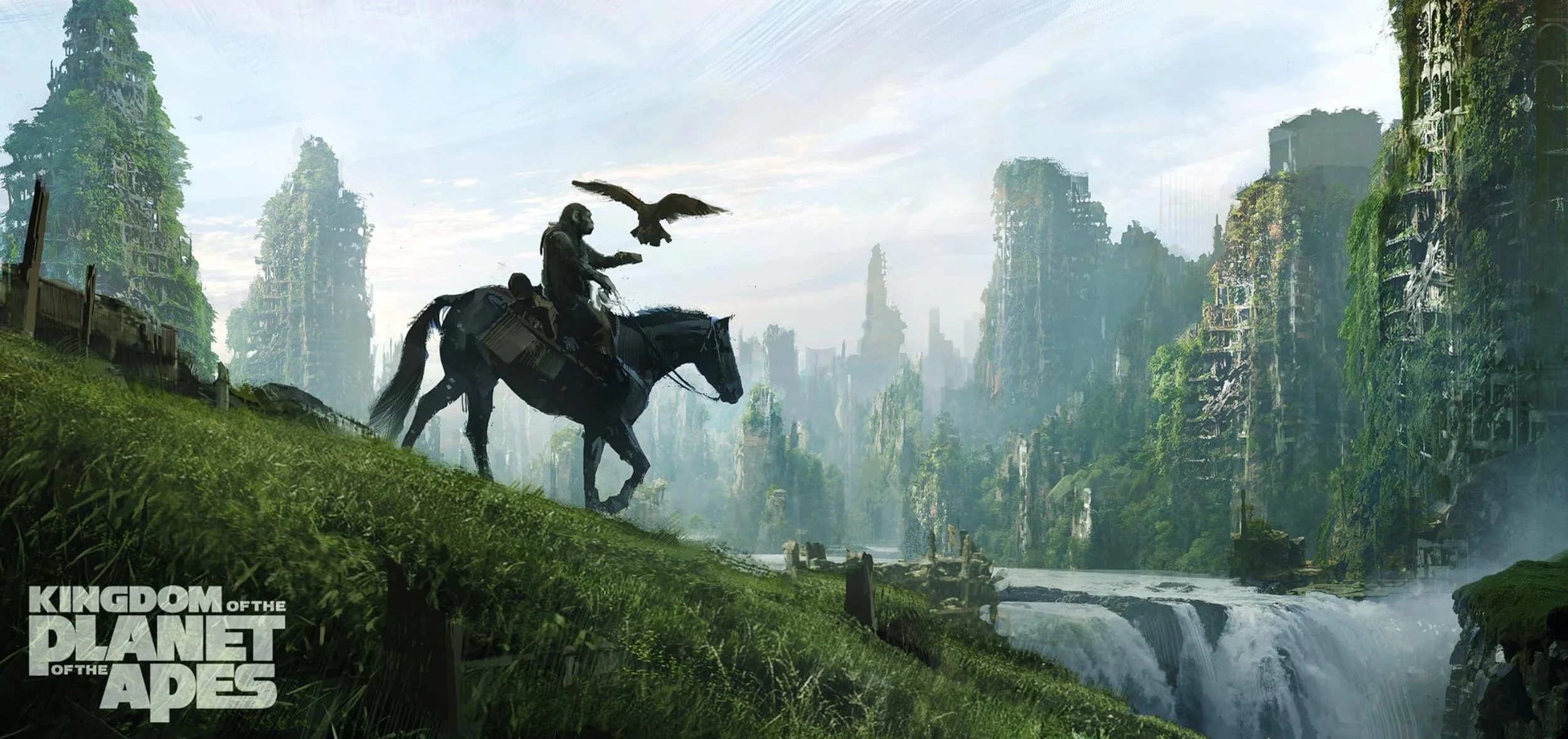
Kingdom of the Planet of the Apes
May 7th, 2024 / Kevin Ward — ★★★½☆
Kingdom of the Planet of the Apes offers a riveting narrative with breathtaking visuals. Although it doesn't eclipse the benchmarks of the Caesar-centered trilogy, it solidly holds its ground, continuing the legacy of the Planet of the Apes saga with flair.
As the film begins, we are drawn back into a world engulfed by a lush green forest. From afar, it seems as if the trees themselves host built structures. Yet, as the camera draws nearer, we discover that these are not mere constructions but skyscrapers and buildings now ensnared by the encroaching forest. This scene unveils a breathtakingly beautiful apocalypse, where the remnants of a once-thriving civilization peek through the verdant overgrowth, setting a stunning and evocative stage for the unfolding narrative.
The film's visual effects are nothing short of stunning. The fusion of motion-capture apes within this vibrant and verdant setting offers an almost unparalleled visual feast, rivaling the achievements of James Cameron's Avatar franchise. Particularly noteworthy is a water-centric action set-piece in the third act, which highlights the remarkable effects and almost feels like an ode to Avatar: The Way of Water.
The story unfolds generations after the original films, with Caesar's teachings lingering like distant echoes among the apes. This narrative cleverly maintains continuity with previous films while not overly constrained by their lore. A standout element is how Proximus Caesar, the new ape king, has corrupted Caesar's famous motto, "Apes together, strong," twisting it into a tool for his authoritarian ends. This manipulation sets the stage for a deep and introspective look at how the words of a messianic figure can be perverted to serve particular self-interests.
The casting adds a rich layer to the film. As Proximus Caesar, Kevin Durand delivers a compellingly villainous performance with a voice that commands attention. Owen Teague as Noa, the film's protagonist, shines particularly in the opening sequence, which introduces his character's deep bonds with Anaya and Soona during a daring climb for an eagle's egg. This scene showcases the film's stunning visuals and solidifies the camaraderie among the trio. Peter Macon's portrayal of Raka, an ape who embodies Caesar's authentic legacy, introduces Noa to a broader historical context, enriching the narrative.
Kingdom of the Planet of the Apes is not devoid of its flaws, despite its compelling attributes. As the narrative unfolds, the film’s extended duration begins to weigh on the pacing, which noticeably loses its briskness around the midpoint, suggesting that a more concise approach might have benefited the overall rhythm. Moreover, the character development presents a stark contrast between the apes and the humans, particularly in the second half of the film. The apes are portrayed with rich, nuanced characterizations, making their motives and personal growth clear and impactful. This detailed portrayal of the apes highlights the complexity of their society and individual struggles, which starkly contrasts with the treatment of Mae, a human character introduced later in the story played by Freya Allan. Mae’s motivations remain ambiguous and underexplored, leaving viewers puzzled about her decisions and her role within the broader narrative. This lack of clarity around her character slightly complicates the plot, making her presence in the story feel less integrated and somewhat perplexing in comparison to the well-realized ape characters.
Director Wes Ball, known for adeptly handling the dynamic and visually engaging narratives in the Maze Runner franchise, brings the same meticulous craftsmanship to Kingdom of the Planet of the Apes. His direction masterfully balances the film's grand visual spectacles with a strong focus on character development, ensuring the story remains grounded amidst its lush settings and high-tech motion-capture creatures. Ball's ability to weave together compelling storytelling with innovative visual techniques makes him an ideal choice to helm this continuation of the Planet of the Apes saga. His involvement instills fresh energy into the series and heightens anticipation for his next project, the upcoming Legend of Zelda, where his distinctive style should have an opportunity to shine once again.
Kingdom of the Planet of the Apes is a thrilling addition to the saga. The film excels in its visuals and fresh take on the established lore. Noa is a compelling new protagonist, and I eagerly anticipate further explorations of this universe in upcoming installments. This film reinvigorates the franchise and ensures its resonant themes and visual splendor continue captivating audiences.
Director: Wes Ball
Screenplay: Josh Friedman, Rick Jaffa, Amanda Silver, Patrick Aison
Cast: Owen Teague, Freya Allan, Kevin Durand, Peter Macon, William H. Macy
Producer: Wes Ball, Joe Hartwick, Jr., Rick Jaffa, Amanda Silver, Jason Reed
Runtime: 145 minutes
Rated: PG-13

